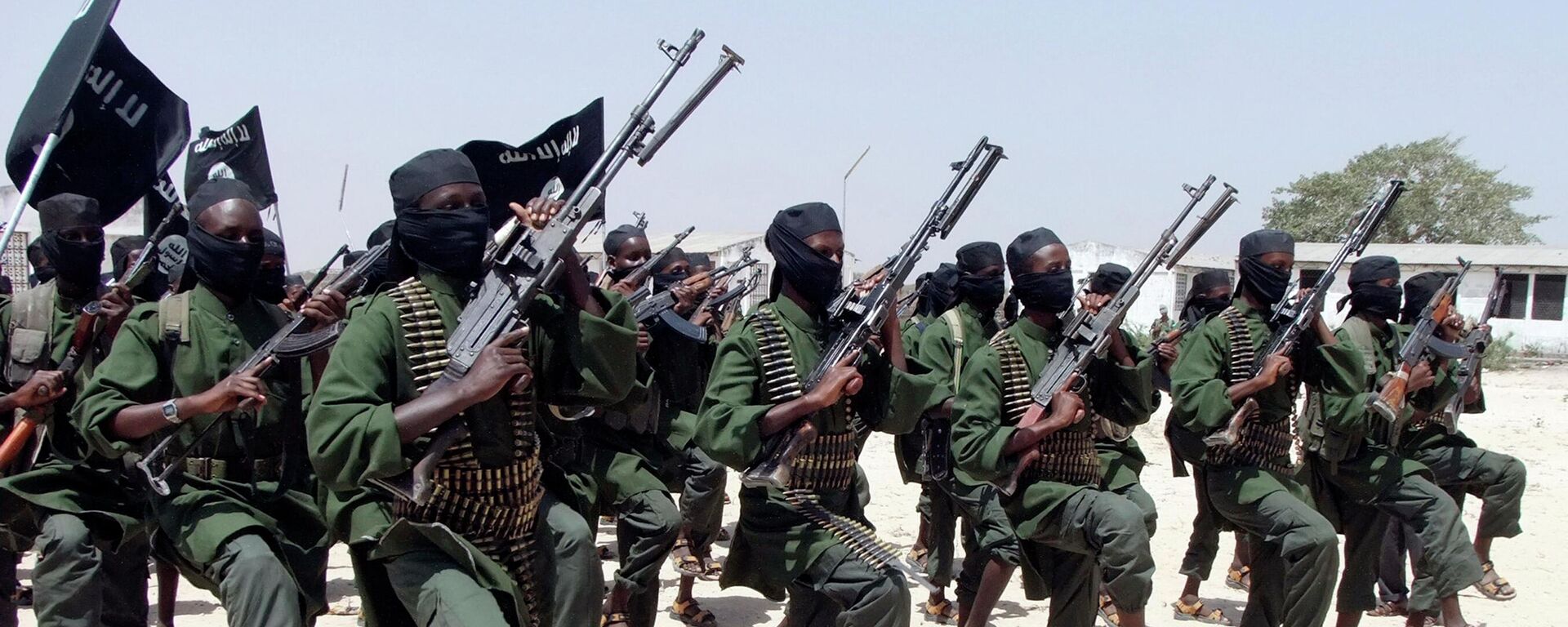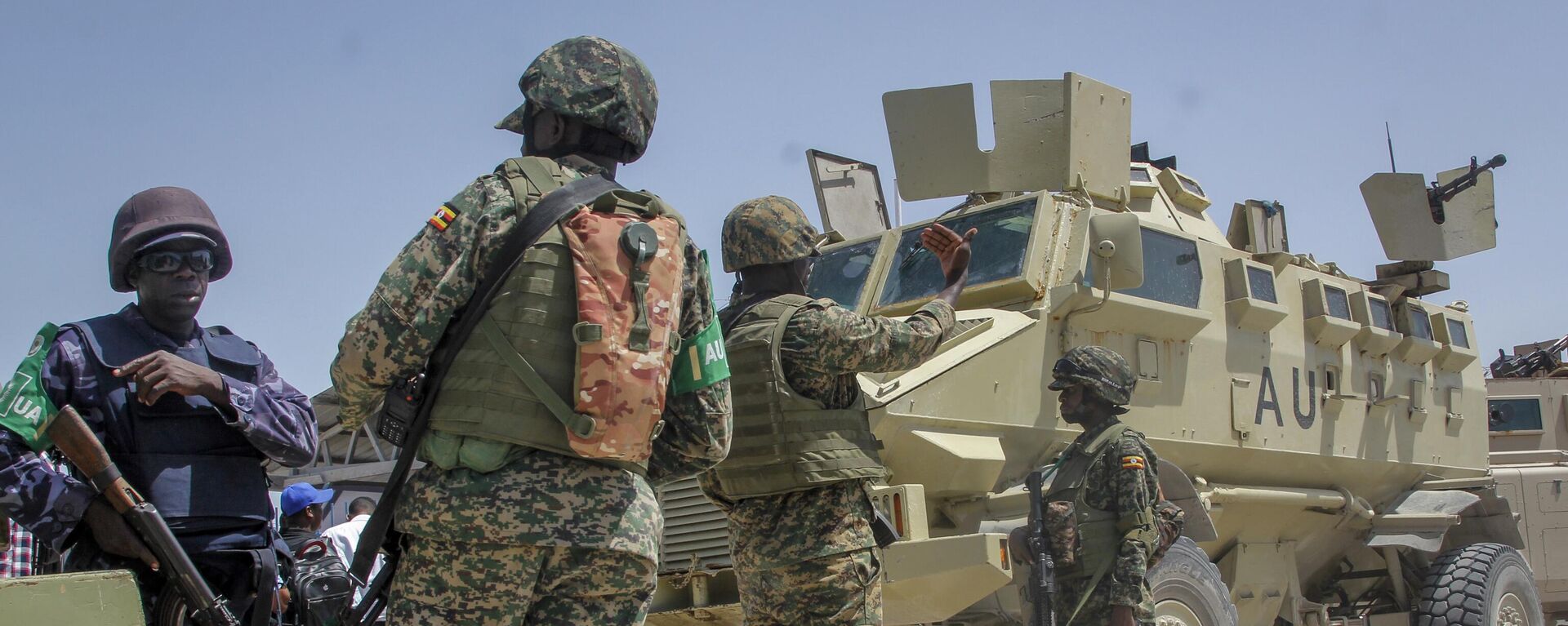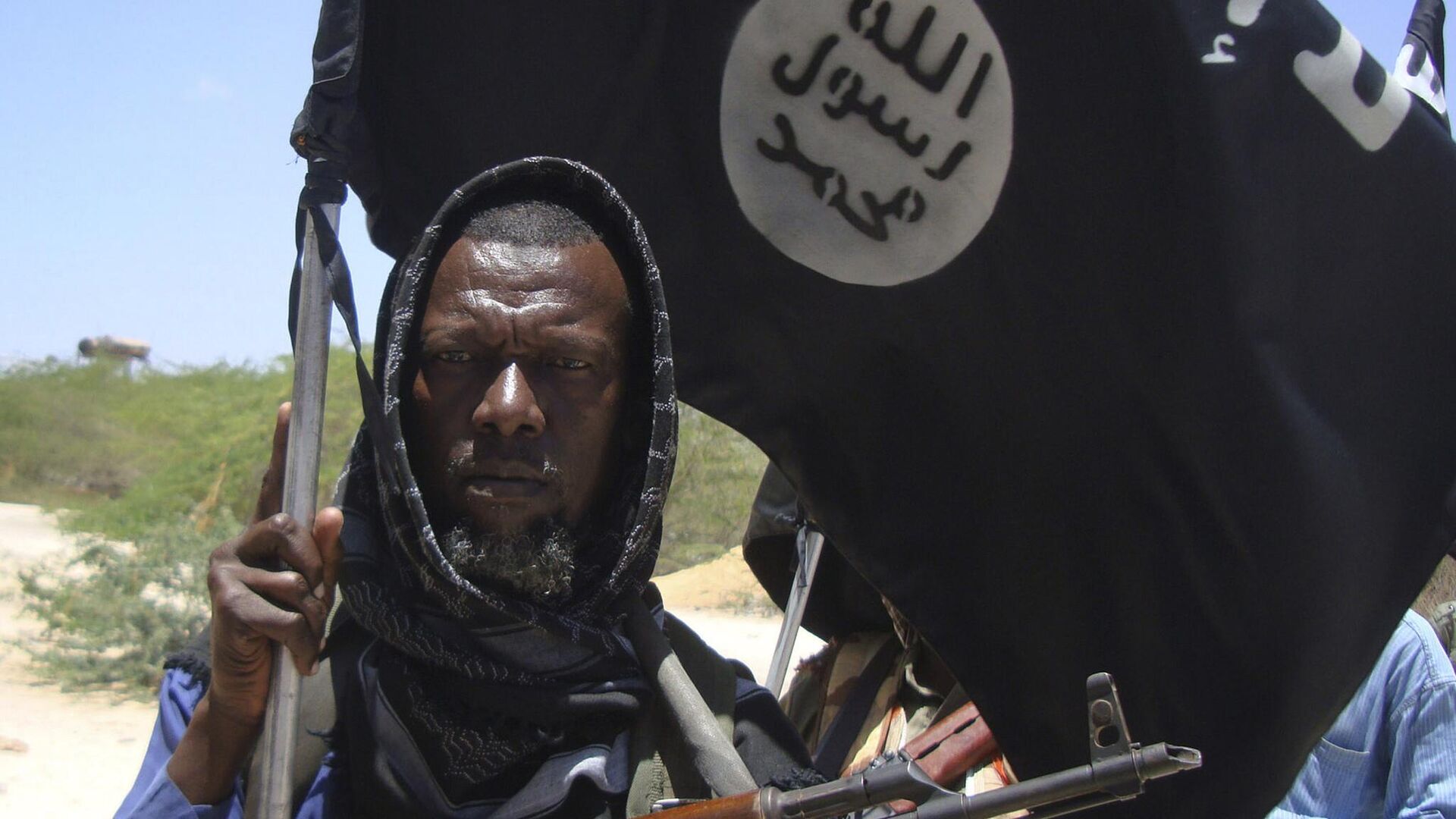https://sputnikglobe.com/20221128/somalias-al-shabaabs-bloodiest-deeds-1104786069.html
Somalia's Al-Shabaab's Bloodiest Deeds
Somalia's Al-Shabaab's Bloodiest Deeds
Sputnik International
The name of al-Shabaab is associated with numerous attacks in Somalia as well as abroad. In this article, Sputnik recounts five most deadly ones.
2022-11-28T17:30+0000
2022-11-28T17:30+0000
2022-11-28T17:30+0000
africa
east africa
somalia
al-shabaab
terrorism
civil war
somalian civil war
https://cdn1.img.sputnikglobe.com/img/07e6/0b/1c/1104789420_0:512:2048:1664_1920x0_80_0_0_2a3c7df0fbc8d31a57ce25d49b43e7a9.jpg
Al-Shabaab* (officially named Harakat al-Shabaab al-Mujahideen, meaning "Movement of Striving Youth" in Arabic) began its operations in 2006 in response to the Ethiopian invasion of Somalia. Since then, the Salafi jihadist group has become the Somali government's main opponent in the country's civil war – and one of the world's most notorious terrorist organizations. After the group came under pressure in the early 2010s, losing previously seized territories, al-Shabaab embraced a strategy of terror and in 2012 pledged allegiance to Al-Qaeda*.The name al-Shabaab is associated with numerous attacks in Somalia as well as abroad. In this article, Sputnik recounts the five deadliest ones.Kampala, July 11, 2010On July 11, 2010, two suicide bombings occurred in the capital of Uganda, targeting crowds that were watching a screening of the 2010 FIFA World Cup Final. Al-Shabaab claimed responsibility for the acts, which left at least 74 people dead and 85 injured.This was the movement's first attack outside Somalia, carried out in retaliation against Uganda's support for the peacekeeping African Union Mission in Somalia (AMISOM).Mogadishu, October 4, 2011A truck with explosives was driven into the gate of the ministerial complex of the Transitional Federal Government on October 4, 2011. At least 100 people were left dead and more than 110 injured as a result of the attack. Al-Shabaab announced that it carried out the bombing in order to kill government officials, African Union troops, and "other informers who were in the compound," but in fact, most of the victims were students and their parents concentrated around the Ministry of Higher Education, awaiting news about scholarships to study in Sudan and Turkey.Garissa, April 2, 2015Having become a transnational terrorist threat, al-Shabaab carried out multiple attacks in Kenya in 2011-2014, leading to the issuance of travel warnings to Western citizens by their governments, affecting Kenya's tourism sector.On April 1, 2015 Kenyan President Uhuru Kenyatta slammed the UK and Australia for their travel warnings. A day later, four al-Shabaab gunmen took over 700 students at Garissa University College hostage in the town of Garissa, northeastern Kenya. The attackers were reported to have set Muslims free, while killing Christians. A total of at least 148 people were killed and 79 injured, making the terror attack the second deadliest in Kenya's history.Mogadishu, October 14, 2017The deadliest terror attack in the history of Somalia and second deadliest terrorist attack in African history occurred when two truck bombs exploded in the country's capital on October 14, 2017, killing at least 587 people and leaving 316 others injured. Most of the casualties were caused by one of the trucks blowing up near the Safari Hotel in the Hodan district of the city.No organization claimed responsibility for the bombings, but according to Somali intelligence, an al-Shabaab cell was behind it, with the Mogadishu airport compound – where the UN offices, most embassies, and the headquarters of AMISOM were located – being the initial target.Mogadishu, October 29, 2022 In May 2022, a new Somali government was elected. Several months later, after another terror attack, the country's President Hassan Sheikh Mohamud announced an "all-out war" on al-Shabaab.On October 29, at least 121 people were killed and over 300 injured in the deadliest attack in Somalia since the October 14, 2017 bombings – taking place at the same junction. Two truck bombs hit the country's Education Ministry, a school, and, reportedly, an ambulance coming to transport casualties from the first explosion.Al-Shabaab claimed responsibility for the act.On Sunday, November 27, 2022 al-Shabaab militants attacked the Villa Rose hotel in Mogadishu, reportedly causing at least four deaths in the latest terror act by the group. The hotel, which is situated a few blocks from the presidential office, is a popular rendezvous for government officials.*Al-Shabaab and Al-Qaeda are terrorist organizations outlawed in Russia and other countries.
https://sputnikglobe.com/20221023/militants-storm-hotel-in-somalia-leave-8-people-injured-reports-say-1102551888.html
https://sputnikglobe.com/20221111/un-identifies-best-response-to-terrorism-threat-in-africa-1104006612.html
africa
east africa
somalia
Sputnik International
feedback@sputniknews.com
+74956456601
MIA „Rossiya Segodnya“
2022
News
en_EN
Sputnik International
feedback@sputniknews.com
+74956456601
MIA „Rossiya Segodnya“
Sputnik International
feedback@sputniknews.com
+74956456601
MIA „Rossiya Segodnya“
al-shabaab most deadly attacks, islamism in africa, terrorism in africa, somali civil war, mogadishu bombings
al-shabaab most deadly attacks, islamism in africa, terrorism in africa, somali civil war, mogadishu bombings
Somalia's Al-Shabaab's Bloodiest Deeds
The Horn of Africa nation of Somalia has been in state of a civil war for more than 30 years. During this time, the population of East Africa has faced countless acts of violence, many of which have been carried out by the jihadist organization al-Shabaab*, which continues to carry out attacks to this day.
Al-Shabaab* (officially named Harakat al-Shabaab al-Mujahideen, meaning "Movement of Striving Youth" in Arabic) began its operations in 2006 in response to the Ethiopian invasion of Somalia. Since then, the Salafi jihadist group has become the Somali government's main opponent in the country's civil war – and one of the world's most notorious terrorist organizations.
After the group came under pressure in the early 2010s, losing previously seized territories, al-Shabaab embraced a strategy of terror and in 2012 pledged allegiance to Al-Qaeda*.
The name al-Shabaab is associated with numerous attacks in Somalia as well as abroad. In this article, Sputnik recounts the five deadliest ones.
On July 11, 2010, two suicide bombings occurred in the capital of Uganda, targeting crowds that were watching a screening of the 2010 FIFA World Cup Final. Al-Shabaab claimed responsibility for the acts, which left at least 74 people dead and 85 injured.
This was the movement's first attack outside Somalia, carried out in retaliation against Uganda's support for the peacekeeping African Union Mission in Somalia (AMISOM).
Mogadishu, October 4, 2011
A truck with explosives was driven into the gate of the ministerial complex of the Transitional Federal Government on October 4, 2011. At least 100 people were left dead and more than 110 injured as a result of the attack. Al-Shabaab announced that it carried out the bombing in order to kill government officials, African Union troops, and "other informers who were in the compound," but in fact, most of the victims were students and their parents concentrated around the Ministry of Higher Education, awaiting news about scholarships to study in Sudan and Turkey.

23 October 2022, 14:04 GMT
Having become a transnational terrorist threat, al-Shabaab carried out multiple attacks in Kenya in 2011-2014, leading to the issuance of travel warnings to Western citizens by their governments, affecting Kenya's tourism sector.
On April 1, 2015 Kenyan President Uhuru Kenyatta slammed the UK and Australia for their travel warnings. A day later, four al-Shabaab gunmen took over 700 students at Garissa University College hostage in the town of Garissa, northeastern Kenya. The attackers were reported to have set Muslims free, while killing Christians. A total of at least 148 people were killed and 79 injured, making the terror attack the second deadliest in Kenya's history.
Mogadishu, October 14, 2017
The deadliest terror attack in the history of Somalia and second deadliest terrorist attack in African history occurred when two truck bombs exploded in the country's capital on October 14, 2017, killing at least 587 people and leaving 316 others injured. Most of the casualties were caused by one of the trucks blowing up near the Safari Hotel in the Hodan district of the city.
No organization claimed responsibility for the bombings, but according to Somali intelligence, an al-Shabaab cell was behind it, with the Mogadishu airport compound – where the UN offices, most embassies, and the headquarters of AMISOM were located – being the initial target.
Mogadishu, October 29, 2022
In May 2022, a new Somali government was elected. Several months later, after another terror attack, the country's President
Hassan Sheikh Mohamud announced an "all-out war" on al-Shabaab.
On October 29
, at least 121 people were
killed and over 300 injured in the deadliest attack in Somalia since the October 14, 2017 bombings – taking place at the same junction. Two truck bombs hit the country's Education Ministry, a school, and, reportedly, an ambulance coming to transport casualties from the first
explosion.Al-Shabaab claimed responsibility for the act.
On Sunday, November 27, 2022 al-Shabaab militants
attacked the Villa Rose hotel in Mogadishu, reportedly causing at least four deaths in the latest terror act by the group. The hotel, which is situated a few blocks from the presidential office, is a popular rendezvous for government officials.

11 November 2022, 13:05 GMT
*Al-Shabaab and Al-Qaeda are terrorist organizations outlawed in Russia and other countries.




